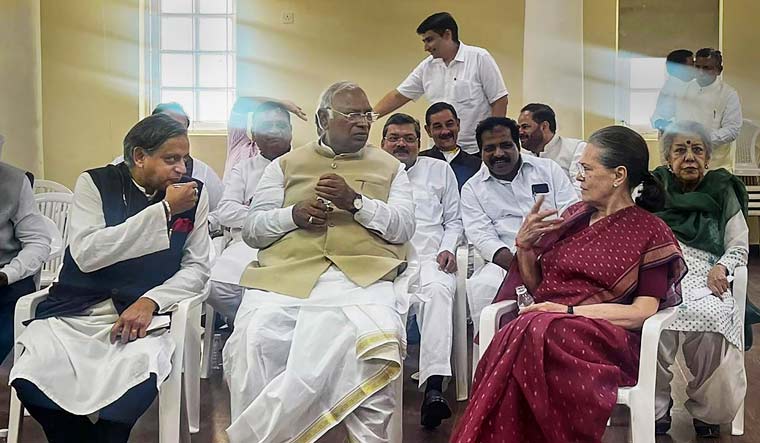An arduous journey awaits Mallikarjun Kharge who took over the mantle of the Congress from the longest-serving party president Sonia Gandhi on Wednesday as the party strives to regain its hold among the masses and revive its electoral fortunes.
Kharge's tenure at the helm begins when the Congress is electorally at its worst, having lost nearly ten elections since 2020 after a severe drubbing in two consecutive Lok Sabha polls, and is facing tough competition from regional outfits even in the Opposition space.
Facing multiple challenges, the veteran leader has to make the Congress battle-ready by resuscitating the largely-comatose party organisation, stemming the exits and checking factionalism in states.
The 80-year-old veteran's elevation in the 137-year-old party is also intended to shed its image that it is a family-run outfit, at a time when Prime Minister Narendra Modi has launched an all-out attack on the so-called ''dynastic parties'', alleging that "family-owned" parties are the biggest threat to democracy.
Kharge also faces the challenge of restoring the Congress party's primacy in the Opposition space, implementing radical reforms the party pledged at the mid-May Chintan Shivir in Udaipur and maintaining his independence in the face of insinuations that he is an "establishment" candidate and would seek the approval of Gandhis in all decisions.
He is the first non-Gandhi to take over the party after 24 years and the second Dalit leader to hold the post in 50 years after Jagjivan Ram led the Congress in 1969.
For Kharge, who has served as the leader of the opposition in the Karnataka assembly, leader of the Congress in Lok Sabha and later the leader of the opposition in Rajya Sabha, the current assignment comes when the party is in power on its own only in two states - Chhattisgarh and Rajasthan - and is struggling to reclaim its turf in others.
The immediate task for Kharge would be to deliver the Congress a fighting chance in Himachal Pradesh which goes to elections in days from now on November 12.
Soon after, the new Congress chief would need to put the party's house in order in election-bound Gujarat where an aggressive incumbent BJP will go all out to hold power and new entrant AAP appears set to present a serious challenge, eroding the advantage the Congress could have traditionally enjoyed in a direct fight with the saffron party.
Next year, the Congress would need to be ready for nine elections that are due including in Chhattisgarh, Rajasthan and in Kharge's home state of Karnataka where he was an MLA for nine terms - over 37 years - and held almost all positions in the party and government, though he was never the chief minister of the state.
With these initial electoral challenges, the ultimate acid test for Kharge would be to restore Congress primacy in the opposition space ahead of the 2024 general elections when Prime Minister Narendra Modi would seek a third term.
Kharge's election also comes at a time the party is reeling under internal rumblings and high-profile exits after a series of electoral debacles, with the organisation reduced to a shadow of its former formidable self when it ruled over the majority of the states and the country.
He will also have to deftly address the "old versus new" challenge within the party as it has pledged to give 50 percent of posts to the young generation of leaders who have been seeking a greater share in the running of party affairs.
His future decisions will also come under close scrutiny, especially when some within the party, as well as outside, have claimed that he has the "blessings" of the Gandhis, suggesting that he will be a proxy.
The BJP, which maintained that Kharge's election was an internal matter of the Congress, wondered if he will be made a scapegoat if his party performs poorly in the upcoming assembly polls in Gujarat and Himachal Pradesh.
Admitting the challenges ahead, the new Congress chief said soon after assuming charge, "I know it is a difficult phase and everyone knows the manner in which efforts are being made to change the democracy established by the Congress in the country."
Realising the immediate electoral challenges, Kharge also said in the coming Himachal Pradesh and Gujarat elections, everyone in the party would have to put in all their strength and united efforts to help emerge victorious as the people of these states want a change.
"We will have to strongly perform in these states and we will need everyone's strength and energy to succeed in them together," he said.
Sonia Gandhi also, in her farewell speech, expressed confidence that party workers and leaders will unitedly emerge as a force that will successfully deal with the problems of the country.
"The Congress has been faced with big hurdles in the past too but the party never accepted defeat. Today also, with full unity, resolve and strength we have to move forward and succeed," Gandhi asserted.
Congress may have succeeded in showing internal democracy by holding organisational polls at the top level, but it will have to walk the talk on restoring democracy at all levels and posts in the organisation.
For the old warhorse of the Congress, who is well known for hardly ever losing an election except the 2019 Lok Sabha poll from Gulbarga, it is to be seen if his 50-year political experience will help him to restore the party's glory.




